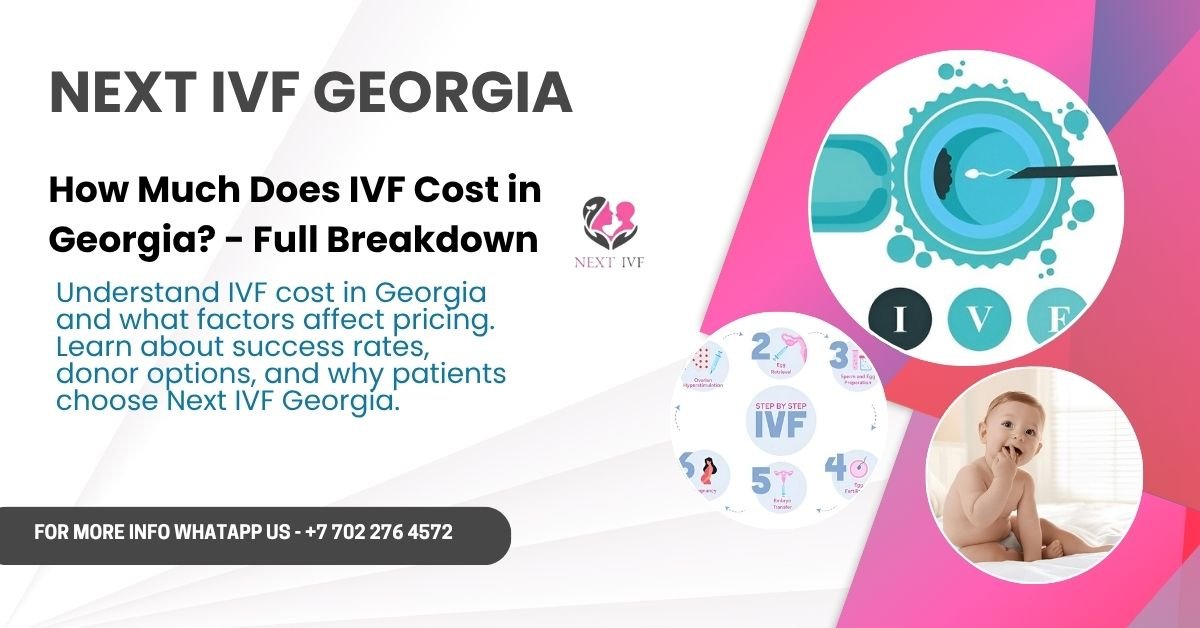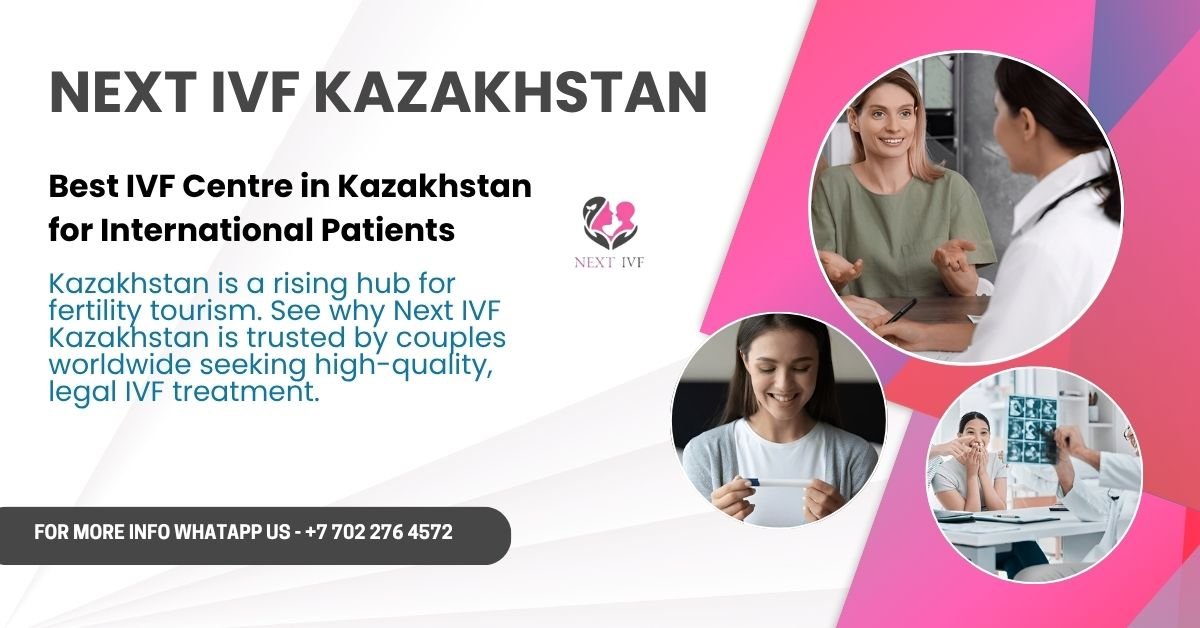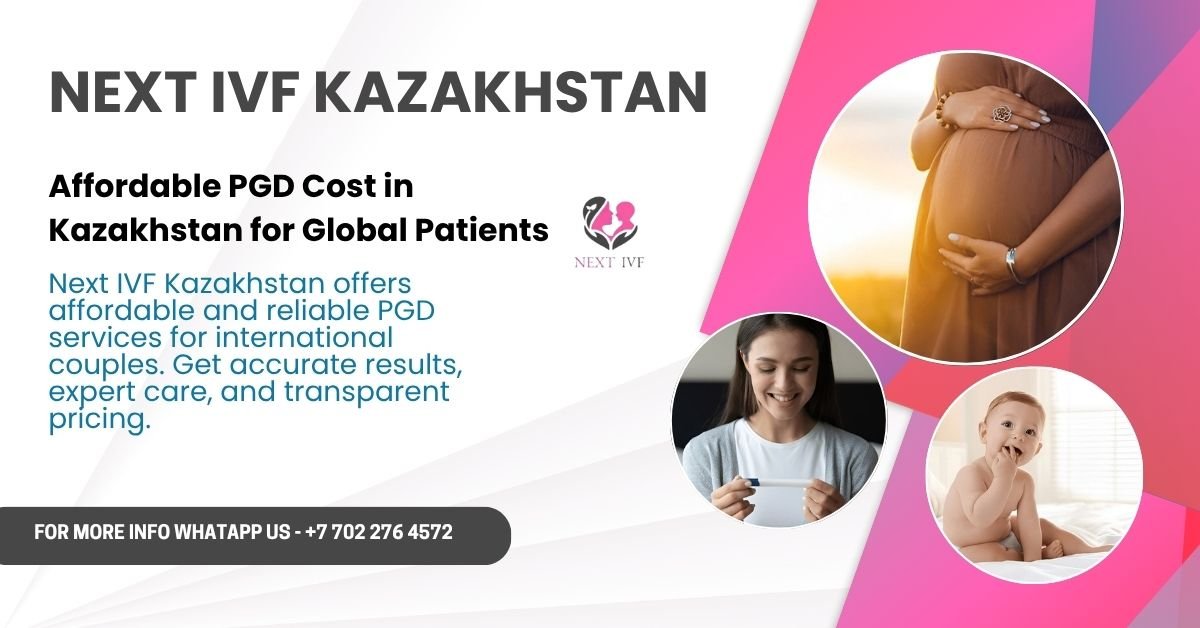Affordable IVF Cost in Georgia
IVF has become a beacon of hope for many couples struggling with infertility worldwide. This advanced fertility treatment involves fertilizing an egg with sperm outside the body in a laboratory and then transferring the resulting embryo into the woman’s uterus. Over the years, Georgia has emerged as a popular destination for IVF treatment, attracting couples from around the globe with its blend of quality healthcare and affordable prices.
For many hopeful parents, understanding the cost of IVF is one of the first and most important questions. IVF is a significant investment emotionally and financially. So, how much does IVF cost in Georgia? This article will guide you through the detailed breakdown of IVF cost in Georgia, factors that influence the costs, and why Georgia is considered a top choice for IVF treatment.
What is IVF?
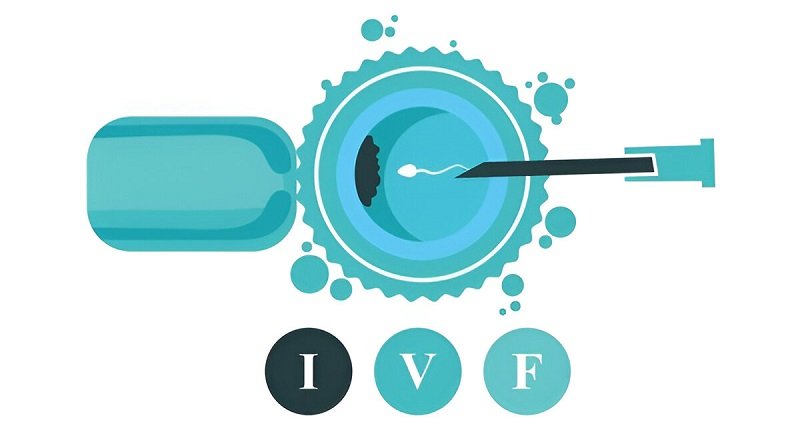
IVF stands for In Vitro Fertilization, a medical procedure designed to help couples who are having difficulty conceiving naturally. Simply put, IVF involves fertilizing an egg with sperm outside the body, in a laboratory, to create an embryo, which is essentially a very early stage baby. Once the embryo develops, it is carefully placed into the woman’s uterus, where it can implant and grow just like in a natural pregnancy.
IVF is especially helpful for couples dealing with problems such as blocked fallopian tubes, low sperm count, irregular ovulation, or unexplained infertility. It is also a wonderful option for single parents or same-sex couples who wish to have a child using donor eggs or sperm.
The entire IVF process is performed by skilled fertility specialists using advanced technology. Typically, one IVF cycle takes about 3 to 6 weeks. While it doesn’t guarantee pregnancy every time, IVF has brought the joy of parenthood to millions worldwide.
For couples who haven’t succeeded with natural methods, IVF can be a hopeful and effective choice, especially in countries like Georgia, where high-quality treatment is available at affordable prices.
How Does IVF Work?
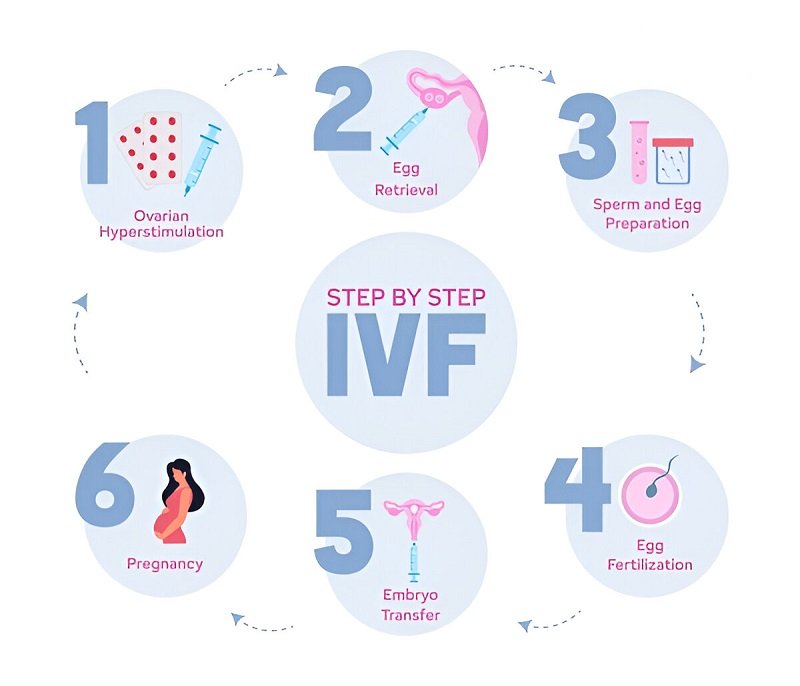
IVF involves several carefully planned steps designed to help couples conceive. Here’s a simple breakdown:
- Egg Stimulation: The woman takes hormone medications for about 10 to 12 days to stimulate her ovaries to produce multiple eggs instead of just one.
- Egg Retrieval: When the eggs are ready, a doctor collects them gently from the ovaries using a thin needle. This procedure is done under light sedation to minimize discomfort.
- Sperm Collection: On the same day, the male partner provides a sperm sample. If donor sperm is needed, it’s sourced from a reputable sperm bank.
- Fertilization: The retrieved eggs and sperm are combined in a laboratory. When a sperm fertilizes an egg, it forms an embryo.
- Embryo Transfer: A few days after fertilization, the healthiest embryo is selected and transferred into the woman’s uterus. This is a quick and simple procedure.
- Pregnancy Test: After about 10 to 14 days, a blood test is conducted to check if the embryo has implanted successfully and if the woman is pregnant.
IVF Process Step-by-Step
The following table helps you to understand the process of IVF in Georgia:
| Step | What happens in IVF |
| 1. Consultation | Meet the fertility doctor. Basic tests are done to understand your body’s needs. |
| 2. Hormone Injections | Women take hormone injections for 10–12 days to produce multiple eggs. |
| 3. Egg Retrieval | Eggs are collected from the woman’s ovaries using a small needle (painless with light sedation). |
| 4. Sperm Collection | Male partner gives sperm sample. Donor sperm can be used if needed. |
| 5. Fertilization | Eggs and sperm are mixed in the lab. If fertilization happens, embryos are formed. |
| 6. Embryo Culture | Embryos grow in the lab for 3–5 days. Best quality embryos are selected. |
| 7. Embryo Transfer | One embryo is placed into the woman’s uterus. It’s a simple and painless procedure. |
| 8. Pregnancy Test | After 10–14 days, a blood test is done to check if pregnancy has started. |
IVF Cost in Georgia
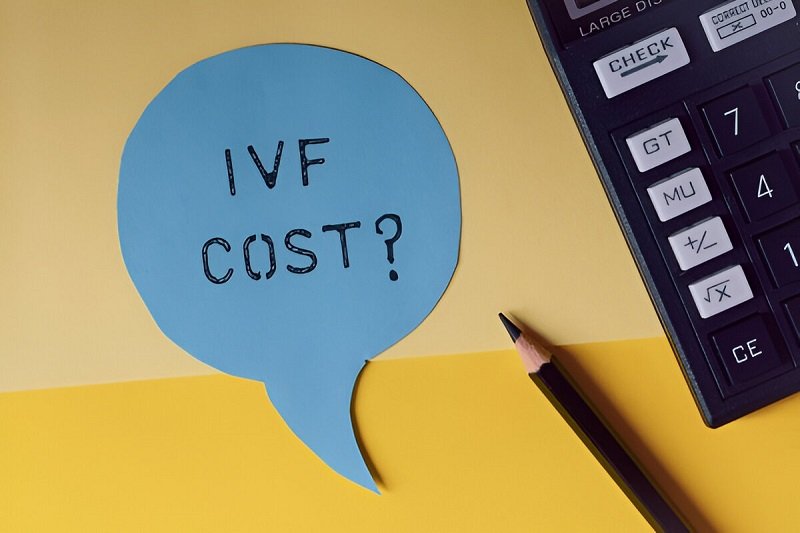
In Georgia, the cost of IVF varies depending on the type of treatment and additional services required. A basic IVF package typically ranges from $3,000 to $5,000, making it an affordable option compared to many Western countries. For couples requiring more advanced techniques, such as IVF with ICSI (Intracytoplasmic Sperm Injection), the price usually falls between $4,000 and $6,000. If egg donation is involved, the cost can increase further, ranging from $5,000 to $7,000.
For those considering surrogacy, the costs are significantly higher, often between $30,000 and $50,000, reflecting the complexity and additional legal and medical procedures involved. Despite the varying prices, fertility clinics in Georgia maintain high standards of care with experienced specialists and modern facilities, making it a trusted destination for many seeking assisted reproductive treatments.
| Treatment/Service of IVF in Georgia | Cost Range of IVF in Georgia (USD) |
| Basic IVF Package | $3,000 – $5,000 |
| IVF with ICSI | $4,000 – $6,000 |
| IVF with Egg Donation | $5,000 – $7,000 |
| IVF with Surrogacy | $30,000 – $50,000 |
| IVF Cycle (base cost) | $10,000 – $13,000 |
| Medications | $3,000 – $5,000 |
| ICSI (if needed) | $1,500 – $2,500 |
| Embryo Freezing & Storage | $1,000 – $2,000 |
The following is the table of expenses involved in the procedure of IVF packages at Next IVF Georgia:
| Other Countries | Cost Range (USD) |
| IVF Cost in India | 1,500 – 3,000 |
| IVF Cost in UAE (Dubai) | 4,000 – 7,000 |
| IVF Cost in USA | 12,000 – 15,000 |
| IVF Cost in Russia | 3,000 – 6,000 |
| IVF Cost in Turkey | 3,500 – 6,500 |
| IVF Cost in Ukraine | 2,500 – 5,000 |
Factors Affecting the Cost of IVF in Georgia
The cost of IVF in Georgia can vary widely depending on many factors. While Georgia offers relatively affordable IVF treatment compared to many Western countries, several elements influence the final price. Understanding these can help you better plan your fertility journey. Here are the key factors affecting IVF costs in Georgia:
Age of the Patient
Age plays a significant role in IVF treatment complexity and success rates. Women over 35 often require additional tests or procedures, which can increase the overall cost. Younger patients may have a simpler and less expensive treatment plan.
Type of IVF Procedure
Basic IVF treatment costs less than advanced procedures like ICSI (Intracytoplasmic Sperm Injection), PICSI, or IMSI, which require specialized laboratory techniques and equipment, thus raising the cost.
Use of Donor Eggs or Sperm
When donor eggs or sperm are involved, additional costs arise for donor screening, matching, and procurement. These can significantly increase the total IVF expense.
Number of IVF Cycles Needed
Not all IVF treatments succeed on the first try. Couples often need multiple cycles to achieve pregnancy, which multiplies the overall cost.
Medications and Hormonal Treatments
IVF requires various fertility medications and hormone injections to stimulate egg production. The dosage and length of medication vary by patient, influencing treatment expenses.
Diagnostic and Pre-treatment Tests
Before starting IVF, patients undergo diagnostic tests such as blood work, ultrasounds, semen analysis, and sometimes genetic screening. These tests add to the overall cost.
Embryo Freezing and Storage
If you choose to freeze embryos for future use, there are additional fees for freezing, storage, and thawing during subsequent IVF cycles.
Clinic Facilities and Expertise
IVF clinics in Georgia with advanced technology, highly experienced fertility specialists, and better success rates typically charge higher fees. Location within Georgia also matters; clinics in Tbilisi might have different pricing compared to smaller cities.
Additional Procedures
Techniques like Assisted Hatching, Preimplantation Genetic Testing (PGT), or Laser Embryo Biopsy are optional and come at an extra cost, depending on the patient’s needs.
Consultations and Follow-up Care
Specialist consultations, monitoring appointments, and follow-up care throughout the IVF process also contribute to the total cost.
Why Choose Georgia for IVF?
Georgia has rapidly become one of the most popular destinations for couples seeking affordable and high-quality IVF treatment. There are several compelling reasons why Georgia stands out as an excellent choice for fertility care:
1. Affordable IVF Treatment Without Compromising Quality
One of the biggest advantages of choosing Georgia is the cost. IVF treatment here is significantly more affordable compared to countries like the USA, UK, or Western Europe, often costing less than half the price. Despite the lower cost, fertility clinics in Georgia maintain very high medical standards. Clinics use the latest technology and follow international protocols, ensuring patients receive safe and effective treatment.
2. Experienced Fertility Specialists and Clinics
Georgia boasts many skilled and internationally trained fertility doctors who have extensive experience in assisted reproductive technologies. The fertility centers are staffed with dedicated embryologists, nurses, and support teams who provide personalized care. Many clinics offer services in English, making communication easy for international patients.
3. Modern Clinics and Advanced Technology
Fertility centers in Georgia are equipped with state-of-the-art laboratories and equipment. From sophisticated embryo culture systems to advanced diagnostic tools, these clinics use cutting-edge technology to improve IVF success rates. Many clinics also offer additional services such as genetic testing (PGT), sperm and egg freezing, and donor programs.
4. Patient-Friendly Regulations
Georgia’s legal framework supports various fertility treatments that might be restricted or heavily regulated in other countries. For example, Georgia allows egg donation, sperm donation, embryo donation, and surrogacy in a regulated and ethical manner. This makes it a welcoming place for singles, same-sex couples, and international patients who might face limitations elsewhere.
5. Personalized and Compassionate Care
Many patients praise Georgian clinics for their personalized attention and compassionate care. Fertility journeys can be emotionally challenging, and having a caring team that listens and supports you throughout the process is invaluable. Clinics often provide counseling and emotional support as part of the treatment.
6. Convenient Location and Travel Access
Georgia is easily accessible from Europe, Asia, and the Middle East. Its capital, Tbilisi, has an international airport with flights from many countries. The visa process for medical tourists is usually straightforward, and Georgia welcomes international patients with open arms.
7. Cultural Hospitality and Comfortable Stay
Georgian culture is known for its warm hospitality. Many international patients appreciate the comfortable accommodation options near fertility clinics, affordable living costs, and the opportunity to explore Georgia’s beautiful landscapes and rich history during their stay. The country offers a friendly environment that helps reduce stress during treatment.
8. High Success Rates
Thanks to advanced medical protocols and experienced staff, many clinics in Georgia report IVF success rates comparable to or better than global averages. This success, combined with affordability, makes Georgia an attractive option for couples facing infertility.
9. Flexible Treatment Options
Georgia offers a wide range of fertility treatments to suit individual needs, including IVF, ICSI, egg and sperm donation, embryo freezing, fertility preservation, and surrogacy. This flexibility ensures patients can find the best solution for their unique situation.
International Patients at Next IVF Georgia
The clinic welcomes patients from:
- India
- Uzbekistan
- Kyrgyzstan
- Russia
- Turkey
- Middle Eastern countries
- Europe (select countries)
We offer support with:
- Visa and travel assistance
- Hotel and local stay
- Medical translators
- Transport to and from clinic
- Remote consultations
What is the success rate of IVF at Next IVF Georgia?

The success rate of IVF treatment at Next IVF Georgia varies depending on several factors, including the patient’s age, health condition, and type of procedure used. Generally, for couples using their own eggs, the success rate ranges between 50% to 60%. This means that around half of the patients undergoing IVF achieve pregnancy through the clinic’s treatment protocols.
For patients opting for donor eggs, the success rate tends to be higher, reaching approximately 70% to 75%. Donor eggs often come from younger, healthy donors, which improves the chances of successful fertilization and implantation.
Next IVF Georgia uses modern technology and follows international standards, which contribute to better outcomes. However, individual results may vary based on personal health factors, lifestyle, and adherence to medical advice. Patients are encouraged to consult directly with the clinic to get a clearer understanding of their specific chances of success.
Why trust Next IVF Georgia?

Struggling with infertility can be emotionally and physically challenging, but you don’t have to face it alone. At Next IVF Georgia, we combine advanced science with genuine care and compassion to help you realize your dream of becoming a mom and dad.
Our centre is dedicated to supporting every couple with personalized fertility solutions tailored to your unique needs. We understand how deeply you desire to start or expand your family, and that’s why our expert team including IVF specialists, gynecologists, embryologists, and supportive staff stands by your side every step of the way.
Why choose Next IVF Georgia as your trusted fertility partner?
- Comprehensive treatments: From IVF, IUI, and frozen embryo transfer to ovum and semen donation, laparoscopy, ICSI, PGD, and male infertility care — we offer the full spectrum of cutting-edge fertility services.
- High success rates: Our proven protocols and experienced specialists maximize your chances of success.
- Affordable care: Quality fertility treatment should be accessible to all. We provide world-class solutions at pocket-friendly prices without compromising on care or outcomes.
Don’t wait any longer to begin your journey toward parenthood. Contact Next IVF Georgia today at +7 702 276 4572 or email us at info@nextivf.com. Together, we’ll make your dream of having a family a beautiful reality — with the right centre, the right doctors, and the right care.
Final Lines
Choosing to start your family through IVF is a deeply personal and hopeful journey. Georgia offers a unique combination of affordable treatment, experienced specialists, and advanced technology—all delivered in a warm and welcoming environment. Whether you are a local or an international patient, the fertility clinics in Georgia are committed to helping you achieve the dream of parenthood with care and professionalism. If natural conception hasn’t worked, exploring IVF options in Georgia could be the right step forward. With transparent costs, personalized treatment plans, and growing success rates, Georgia is fast becoming a preferred destination for fertility treatments worldwide.
Frequently Asked Questions (FAQs)
How much does IVF cost in Georgia?
The cost varies depending on the clinic and treatment type but typically ranges from $3,000 to $5,000 for a basic IVF cycle. Advanced treatments like ICSI or egg donation may cost more.
Is IVF treatment in Georgia safe and effective?
Yes. Clinics in Georgia follow international medical standards, use modern technology, and have experienced fertility specialists, ensuring safe and effective treatment.
Can international patients travel to Georgia for IVF?
Absolutely. Georgia is welcoming to medical tourists and has straightforward visa procedures. Many clinics provide support in multiple languages, including English.
How long does an IVF cycle take in Georgia?
A typical IVF cycle takes about 3 to 6 weeks from ovarian stimulation to embryo transfer and pregnancy testing.
Are there donor egg and sperm programs available in Georgia?
Yes. Georgia allows and supports donor egg, sperm, and embryo programs under regulated conditions, which is helpful for couples or individuals needing donor assistance.
What is the success rate of IVF in Georgia?
Success rates vary by clinic and patient factors but are generally comparable to international averages, often ranging from 35% to 50% per cycle for women under 35.
Can single or same-sex individuals undergo IVF treatment in Georgia?
Yes, Georgia’s fertility laws are inclusive, allowing single parents and same-sex couples to access fertility treatments including IVF.
What additional costs should I expect besides the IVF procedure?
Additional costs may include medications, diagnostic tests, embryo freezing, and any advanced procedures like ICSI or genetic testing.
Read Also:
- PGD Cost in Kazakhstan – A Complete Guide to Prices, Process & Choosing the Right Clinic
- 10 Best Surrogacy Centre in Kazakhstan – Why Next IVF Kazakhstan Leads the List
- Top 10 Best IVF Centre in Kazakhstan 2025 – Why Next IVF Kazakhstan Leads the Way
- Breakthrough IVF Cost in Kazakhstan – Trusted, Proven Results at Next IVF Kazakhstan

